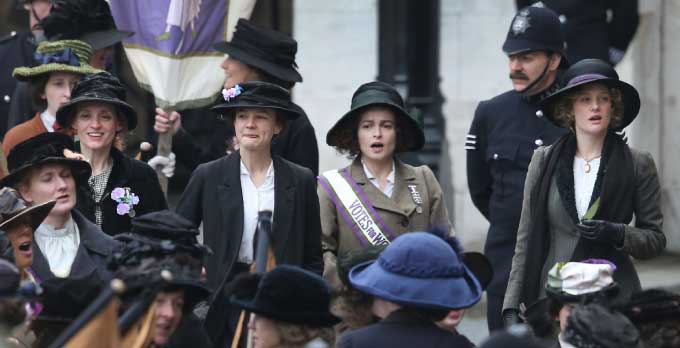Suffragette
by Jordan Canahai

Movies about social injustices of the past, and about the struggles of the oppressed to rise above them, so frequently collapse under the weight of their own noble intentions. Too often, attempts to explore dark chapters of history give us a self-congratulatory take on the present and turn history into an excuse for simple moralizing. Audiences are told to look back at how horrible things used to be and then pat themselves on the back for how far we’ve come. Suffragette, the new British historical drama about the Women’s suffragette movement in the early 20th century, could have easily fallen victim to this formula. Thankfully, director Sarah Gavron and screenwriter Abi Morgan instead choose to use the real-life events detailed in their film to explore a host of issues, including the mechanisms of patriarchal power, the complex realities of political resistance, and the socio-economic effects of the right to vote.
One of the ways Suffragette does this is by not focusing on the leaders remembered in history books, but rather the rank and file foot soldiers of the movement. Our protagonist, Maud Watts (Carey Mulligan, exuding both warmth and determination), works in an industrial laundry alongside other women whose daily routine involves dangerous labor, low pay, and sexual harassment. She accepts her circumstances, finding contentment through her loving husband (Ben Whishaw) and their young son, but soon is caught up in the suffrage movement, attending secret meetings in the backrooms of a pharmacy run by an outspoken suffragist (Helena Bonham Carter). The battle for women’s voting rights, embodied by real-life political activist Emmeline Pankhurst (Meryl Streep, in a brief but memorable role) is well underway, as demonstrators fill London’s streets and civil protests leads to unrest and vandalism.
Part of the film includes faint echoes of political thriller, mostly through the use of a Special Branch detective (Brendan Gleeson) tasked with pursuing the dissenters as they attempt to start a political revolution, highlighting the cruelty that those in power can react with when threatened by the oppressed. Healthy doses of melodrama are also present as Maud is forced to make one difficult sacrifice after another for the movement. What connects these seemingly disparate threads—and why the film ultimately succeeds—is the feminist insight that the subjugation of women extends from the top positions of government through the job sphere and into domestic life. In the Britain depicted in this film, women have no voice in Parliament nor in the workplace, and while the suffragists understand how important their right to vote is, it’s hardly the last battle they’ll need to fight in their struggle for equality.
The script does, unfortunately, rely on one-too-many scenes of speechifying, laying on the dramatic effect a little too heavily at times. Suffragette also suffers in comparison to last year’s extraordinary Selma, another historical drama about the struggle for civil rights which carried a sense of daring and grandeur that the more modest Suffragette lacks. The end result is a relatively conventional but admirable film, one that succeeds due to the truth behind its insights and the sincerity with which its filmmakers address them.
Watch the trailer for Suffragettes
|
Issue Navigation> Issue Index > v14n45 (Week of Thursday, November 12) > Suffragette This Week's Issue • Artvoice Daily • Artvoice TV • Events Calendar • Classifieds |









 Current Issue
Current Issue